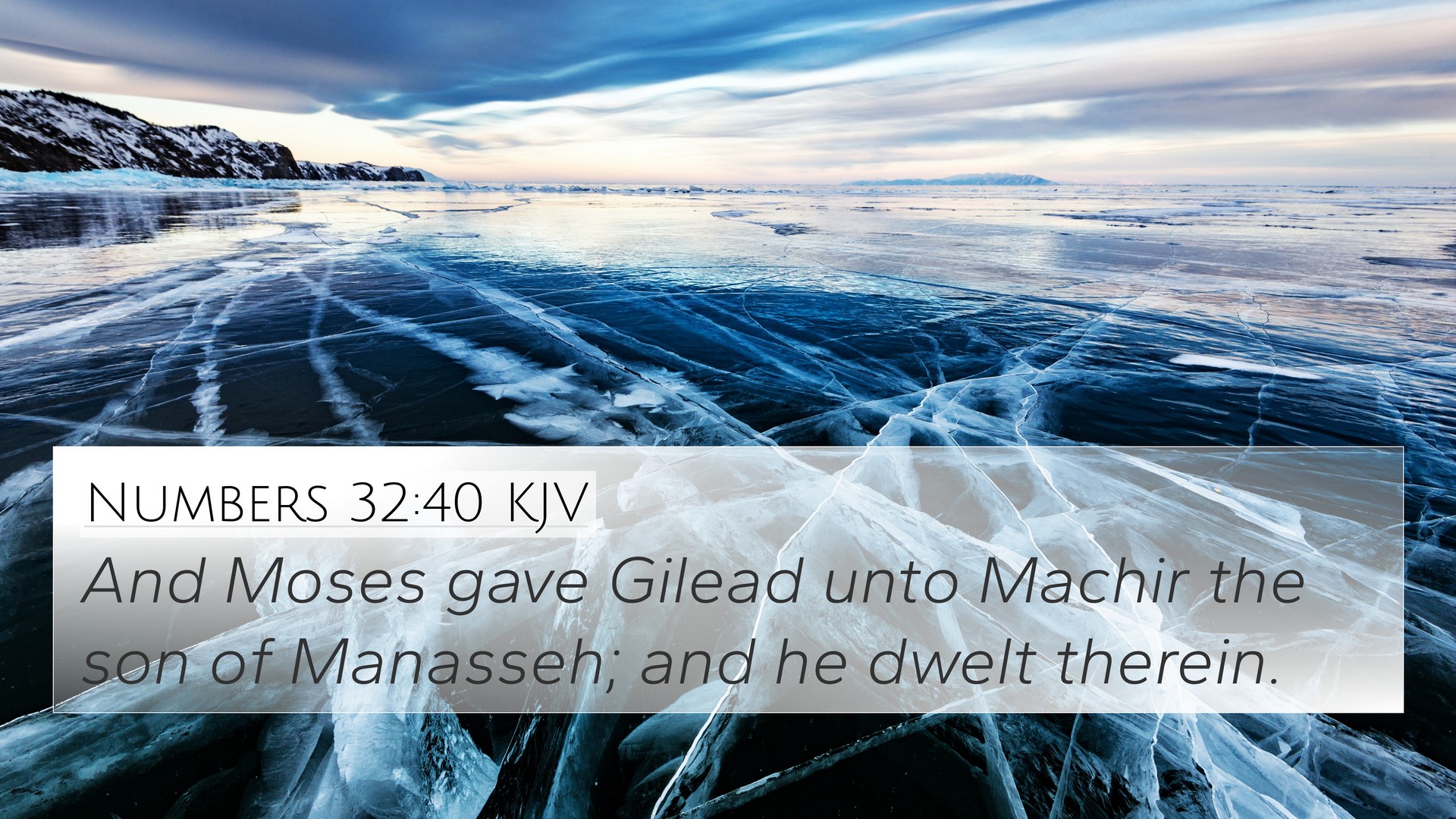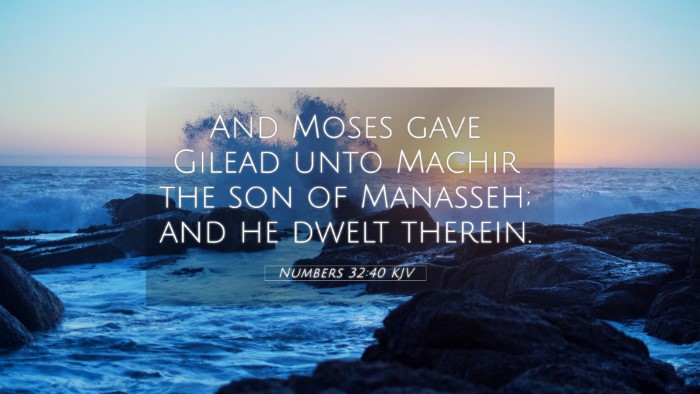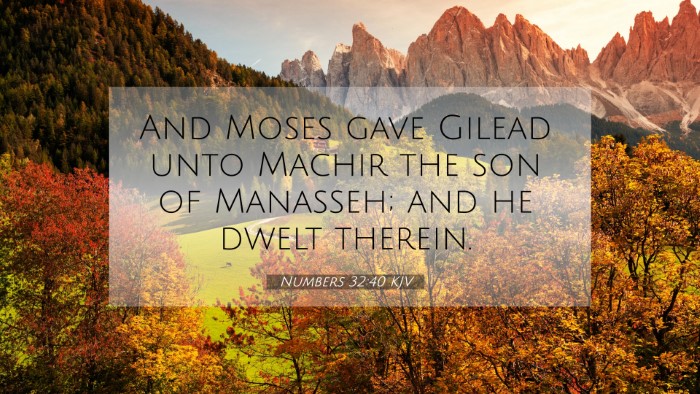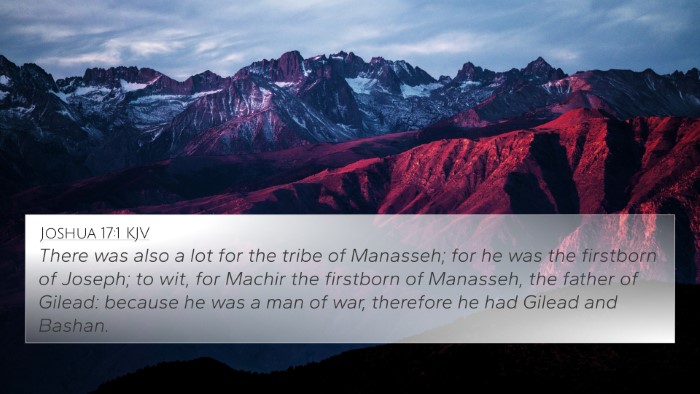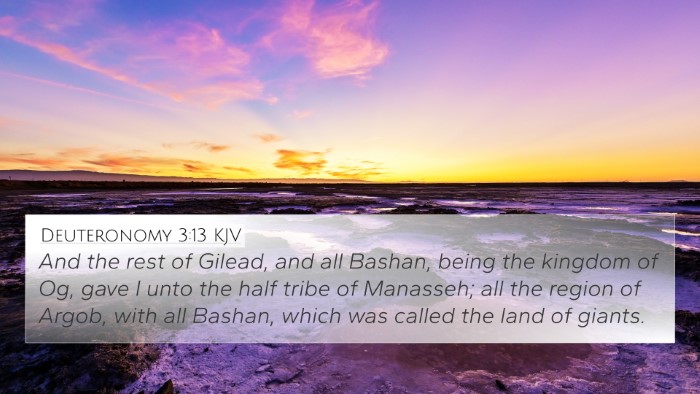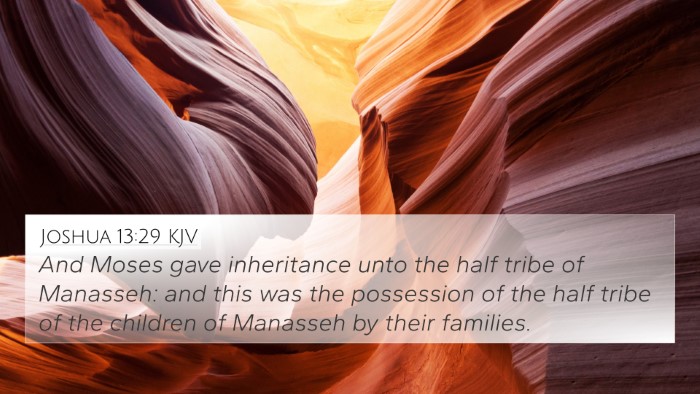Bible Verse Meaning and Interpretation: Numbers 32:40
Verse Text: "And Moses gave Gilead unto Machir the son of Manasseh; and he dwelt therein." (Numbers 32:40)
This verse is integral within the larger context of the Israelite tribes' occupations in Canaan, focusing on the allocation of land. The act of Moses giving Gilead to Machir denotes both a practical and spiritual significance in the unfolding of God’s promise to the people of Israel.
Summary of Insights from Commentaries
-
Matthew Henry's Commentary:
Henry reflects on the importance of land inheritance as a symbol of God’s promises. The tribe of Manasseh, through Machir, signifies the realization of God's covenant as seen in their secure dwelling in Gilead. The commentary emphasizes divine providence in the allocation of land to the tribes, showing God's commitment to His people through tangible blessings.
-
Albert Barnes' Notes:
Barnes highlights Machir’s distinction as a notable figure who received Gilead due to his valor and contributions during the Exodus. His commentary connects this allocation with the broader narrative of God fulfilling His promises and enriching the families of Israel as they transition into the Promised Land.
-
Adam Clarke's Commentary:
Clarke notes the strategic importance of Gilead, indicating that it was not only fertile land but also a strategic military advantage in the regional context. He presents Machir as an earnest and faithful servant of God whose loyalty was rewarded with land that would provide sustenance and security for his descendants.
Cross-references Related to Numbers 32:40
This verse can be cross-referenced with several key passages throughout the Bible that enhance our understanding of land inheritance and God’s promises:
- Joshua 17:1-2 - Details the inheritance of the tribe of Manasseh, illustrating God's promise fulfilled.
- Deuteronomy 3:13-14 - Discusses the land of Gilead, linking it to the conquests and settlements post-Exodus.
- Genesis 48:5 - The blessing of Joseph’s sons and the integration of the tribes into one family aligns with the themes of inheritance.
- Numbers 34:13 - Stipulates the division of the land among the tribes, a foundational aspect of Israel’s identity.
- 1 Chronicles 5:11-16 - Talks about the descendants of Gilead and their settlements, showing continuity of God’s promises.
- Jeremiah 50:19 - Refers to Israel's return to their land, reinforcing themes of restoration.
- Ezekiel 48:23-29 - Provides a prophetic outlook on the inheritance of land, indicating its significance in God’s plan.
Thematic Connections within the Bible
The broader themes surrounding Numbers 32:40 include:
- The Importance of Land: The land symbolizes stability, promise fulfillment, and identity for the Israelites, as evident in various scripture passages.
- God’s Faithfulness: This act of giving the land underscores God’s unwavering commitment to His covenant with the children of Israel.
- Leadership and Responsibility: Moses’ role in guiding the distribution of land highlights the weight of godly leadership in fulfilling God’s will.
- Tribal Identity: The establishment of tribes through land allocations emphasizes their unique roles and destinies as God's chosen people.
How to Use Bible Cross-References
To deepen your understanding of biblical texts, consider these tools and techniques:
- Bible Concordance: A useful tool to locate verses related to themes or keywords, aiding in connecting the narrative.
- Bible Cross-Reference Guide: Reference guides can help identify interconnected verses for comparative study.
- Cross-Referencing Methods: Employ cross-referencing in personal study to find links between various biblical texts.
- Comprehensive Resources: Utilize study Bibles and online databases for extensive Bible cross-reference options.
Conclusion
Numbers 32:40 encapsulates the promise of land and the unfolding covenant between God and His people. Through the insights of notable biblical commentators and cross-references to interconnected scripture, we can appreciate the depth of this verse and its implications on God’s relationship with humanity. The verse serves as a reminder of God's faithfulness, the significance of land in biblical narrative, and the importance of leadership as seen through Moses.
